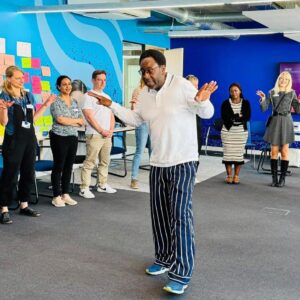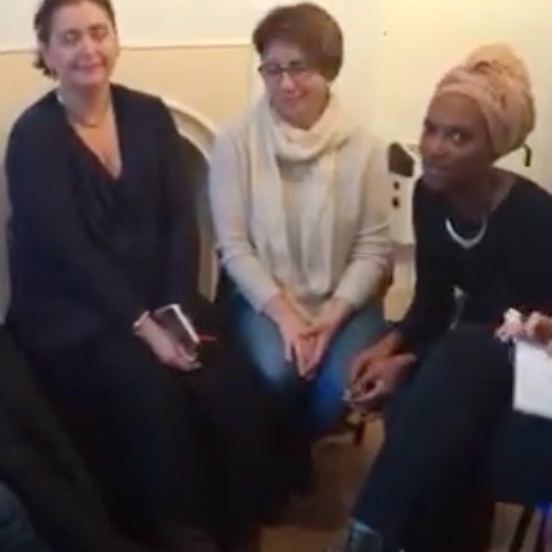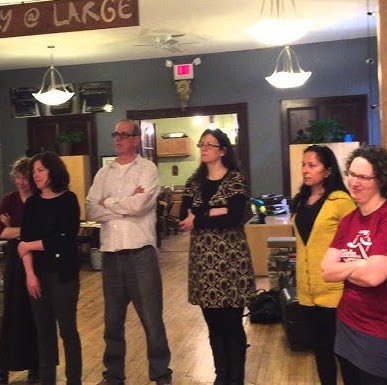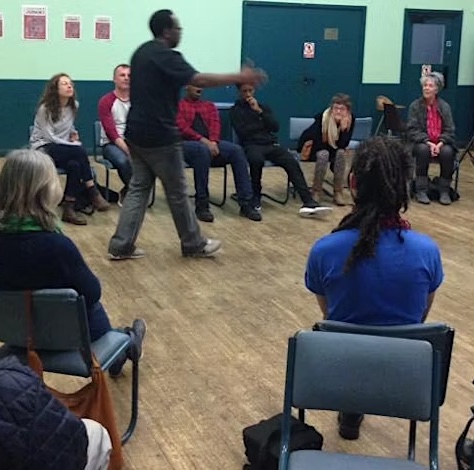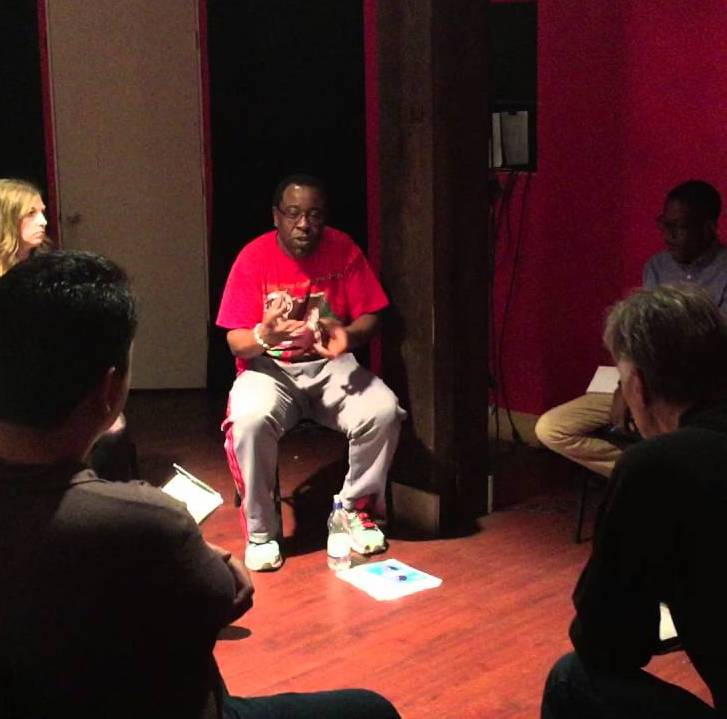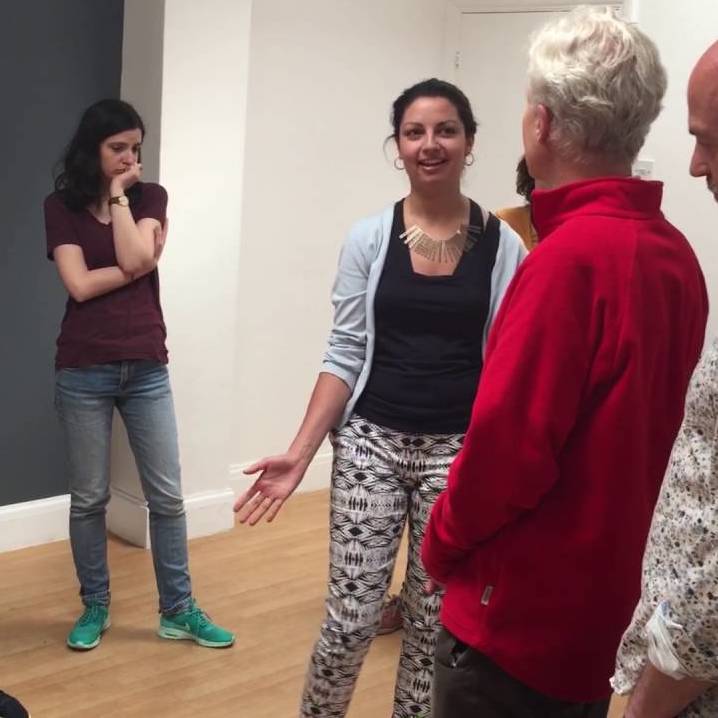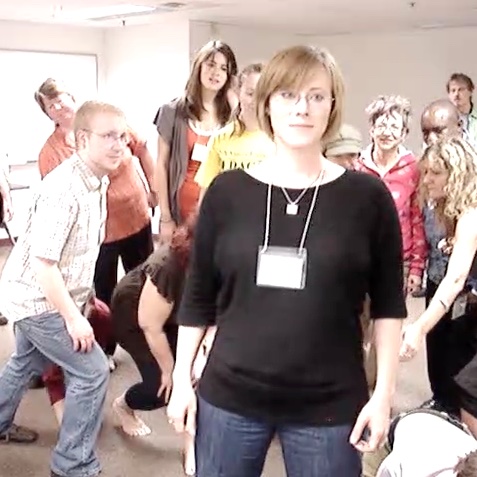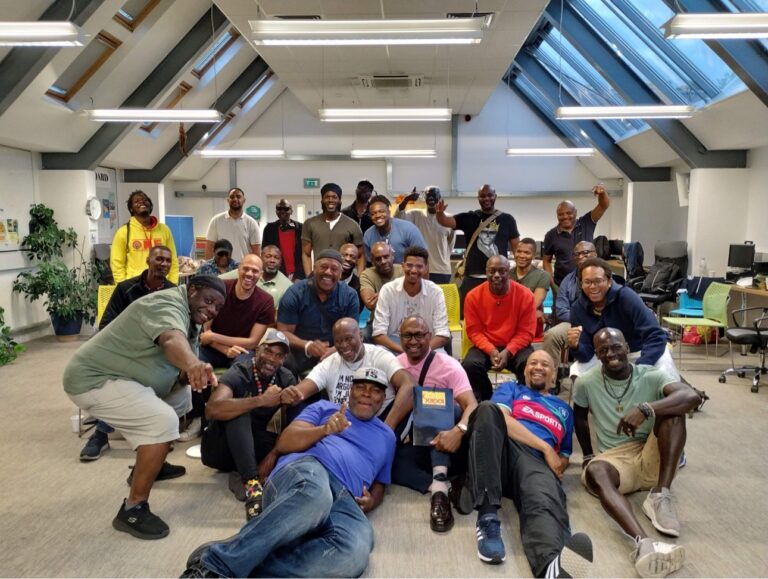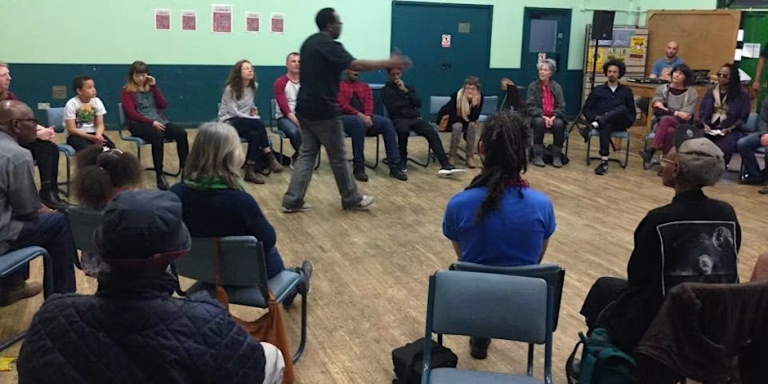Rainbow of Desires (Theatre of the Oppressed)
This training workshop will enable participants to use techniques from Augusto Boal’s Rainbow of Desire to explore internal oppressions or “cops in the head”. Rainbow of Desire, an Image Theatre technique, is a technique similar to Cop-in-the-Head. Where Cop uses games and exercises to recognize and confront internalised forms of oppression,
Rainbow of Desire deals with conflicting needs, desires and wants among individuals and explores power relations and collective solutions to concrete problems.
This is a method and set of techniques that is especially useful for teachers, educators, social workers, psychologists, mental health professionals, community activists and other group leaders who work with marginalized and disadvantaged populations, who have been victims of bias, discrimination and oppression.
Rainbow of Desire is intended to examine conflict within groups, and to seek ways to resolve those situations of conflict.
At the end of this workshop will ‘develop’ the ROD practice group, where others can meet on a monthly basis to ‘try –out’ other techniques from Boal’s arsenal to practice and learn them for their own endeavours.
Contact me for the next set of training dates happening soon.
The Mechanics & Science of Games and Exercises A creative arts Training course specialising in:
- Augusto Boal techniques
- Improvisation
- Devising
- Performance
- Facilitation
- Youth Arts
- Exploring issues;
- Arts within Criminal Justice Settings
This highly practical hands-on course is particularly suited to people who want to experience and practice a variety of creative action methods in group work to explore issues, make theatre or work within challenging contexts.
https://vimeo.com/manage/videos/99215949
Who is this for?
People interested in using drama and theatre as a tool to explore personal and social issues, and for people who want to gain new skills to fulfil their obligation and commitment to the people they serve.
The course covers exercises with explanations, instructions and suggestions to help you develop your own style and approach. The creative action methods can be readily adapted to a wide range of settings with adults and young people.
The course is a resource for: performers, youth workers, social/health workers, PSHE specialists, drama graduates, project managers, community workers, artists, workshop leaders, teachers, theatre practitioners, creative art therapists, counsellors, mental health workers, team builders and special needs workers.
No previous drama experience is necessary; however a willingness to actively explore new methods of working is an essential requirement. This will also be an opportunity for professional development, networking and skill sharing so as to enable continued high standards of good practice.
For myself, I always find these training courses a great shot in the arm, as I have the privilege of watching another cohort of people discover the incredible possibilities of my practice. Usually I have people from all walks of life – activists, social workers, teachers, actors, youth workers, directors, you name it – and the diversity of the group often becomes a great networking resource in itself
Courses Running in 2025
London 22nd – 23rd February 9.30am – 4.00pm (full)
London 21st – 23rd March 10.00am – 4.00pm (full)
London 18th – 20th April 10.00am – 4.00pm (full)
More dates coming soon
All participants receive a free TRAINING MANUAL on completion. Limited amount of reduced rates available.
To see examples of this training course click the links below:
https://youtube.com/watch?v=3-BoHYw1IE4%3Ffeature%3Doembed
Teaching teachers in Uganda
http://vimeo.com/75845244
A training course for Facilitators in dealing with Resistance
This highly practical hands-on course is particularly suited to frontline workers, youth offender teams, teachers, facilitators and workshop leaders who want to acquaint themselves with the challenges involved in working with ‘hard’ groups within prisons, hospitals, probation centre’s, youth clubs, pupil referral units and holiday schemes. You will be able to experience, practice and learn a variety of techniques in managing and dealing with resistance and disengagement in challenging settings.
The facilitator has to perform radical and innovative functions. It’s different from a director, teacher, youth leader, a shaman, cultural activist, therapist or a joker, yet it borrows aspects of these roles.
The facilitator needs to select the most appropriate games, exercises and techniques to bring out the best of the group, which means looking at the geographical, social and cultural context of the workshop session.
The facilitator needs to know enough about participants’ situations to reasonably assess how they’re likely to respond to different stimuli.
How does the facilitator deal with the challenges involved in working with ‘hard’ groups behind closed doors? What does a facilitator do? What are the nuts and bolts of facilitation?
Who is this for?
People who are in related professions such as arts practitioners, social care, therapy, mental health, education, community arts or personal development as well as students and trainees in such professions.
Applications are also encouraged from social inclusion partners who are interested in understanding the role and value of arts-based practice to the groups they work with. It is also for group leaders and anyone who works with difficult groups.
The training covers techniques with explanations, instructions and suggestions to help you develop your own style and approach. The techniques can be readily adapted to a wide range of difficult settings with adults and young people.
No previous experience is necessary; however a willingness to actively explore new methods of working is an essential requirement. This will also be an opportunity for reflective practice, professional development, networking and skill sharing so as to enable continued high standards of good practice.
Courses running in 2025
London 7th – 9th February 9.30am – 4.00pm (full)
London 14th – 16th March 10.00am – 4.00pm (full)
London 11th – 12th April 10.00am – 4.00pm (full)
More dates coming soon
All Participants receive a free TRAINING MANUAL on completion.
Videos from previous trainings:
https://www.youtube.com/watch?v=ZcRxSLkhcgg
https://youtube.com/watch?v=r9JMXsidVDk%3Ffeature%3Doembed
https://youtube.com/watch?v=GhLoc9CtUEE%3Ffeature%3Doembed
https://youtube.com/watch?v=No7auP1CJr4%3Ffeature%3Doembed
https://youtube.com/watch?v=rgc_3woGW5g%3Ffeature%3Doembed
https://youtube.com/watch?v=JICbR54ej2k%3Ffeature%3Doembed
To book : https://www.eventbrite.co.uk/e/beyond-resistance-arts-based-training-for-facilitators-and-group-leaders-tickets-89227147801
Participants from previous courses
“Having attended many courses, programmes and seminars over my twenty years of employment within various facets of the Criminal Justice System I must say that the course was the most informative, creative and enjoyable event I have ever attended.”
Steve Simpson – Haringey Youth Offending Team
“The course was both inspiring and an eye-opener. Working with other professionals gave us a rare insight into working in this field. I feel more confident and aware of the realities and opportunities available in working with challenging groups, or other groups of vulnerable young people.”
Rachel Headman – Outreach Manager, The Prince’s Trust
“Well worth the journey, a fantastic course. Meeting a brilliant group of people and building a pretty awesome network of contacts.”
Janet Campbell – Education Feltham Young Offenders Institute
“I got an in depth insight into the work of the drama facilitator in relation to the theatre work with awkward groups and a fantastic wealth of skills.” Mandy Harman – Multi-Arts practitioner, Haringey Youth Service
“A valuable opportunity to share practices and approach between arts and youth offending professionals.”
Homed Husain – Arts and Community Development Officer, London Borough of Merton
“It was a fantastic opportunity for me, as an arts coordinator, to reflect on how ‘I do’ workshops with awkward groups and individuals – a rare and valuable chance to explore and discuss the dynamics of working with young people and the arts. Go!”
Tricia Fairey – Team Leader Nacro Lambeth
“This training was well focused throughout each day. Tony brings something fresh and unique to the course. Working with him created a powerful experience and allowed me to refine many ideas for dealing with resistance in the future. The training was well thought out, comprehensive and A LOT OF FUN!”
John Ephelin – Musician, Barrier Breakers
“The course was engaging, informative and has motivated me to want to deal with resistance and awkward groups in more confident ways. Tony was approachable and inspiring.
This exhaustive hot-peppered Two-Day intensive workshop uses harmonizing techniques for teachers, facilitators and others who work with groups that might be labelled as awkward, resistant, rebellious and problematic.
The techniques are both fun to play and engaging. They hook in participants using activities that are exciting and challenging.
How do you use social learning, cognitive and behavioral theories in active exercises that provide engaging, challenging and memorable experiences for difficult groups and individuals?
What kinds of games and exercises can illicit skills, tactics and approaches to identify new ways of dealing with old problems and helps people ‘see the point’ of an exercise?
Watch the video here:
https://youtube.com/watch?v=Cpmwk3NnOd0%3Ffeature%3Doembed
Courses running in 2025
- London 3rd– 4th May 9.30am – 4.00pm (full)
- London 17th – 18th May 10.00am – 4.00pm (full)
- London 7th – 8th June 10.00am – 4.00pm (full)
- More dates are coming soon!
https://youtube.com/watch?v=4sVC_bHAP2A%3Ffeature%3Doembed
A guide to the essentials of getting people to improvise creatively and without stress, working from games through to improvisation and beyond.
This improvisation workshop is for improvisers and non-improvisers who are interested in developing, maintaining and extending their skills around some of the essential grammar of dramatic improvisation in long form. The methods will be a mixture of games, exercises, and structured improvisations.
The focus for the workshop will be Ensemble and Narrative Skills with particular reference to two of the fundamental basic grammar or aptitudes within improvisation practice identified as:
- Tension
How it makes us look at something on stage, there are only two reasons why an audience would look at something, one is they want to know what happens next and the other is they want to know the truth of what is going on. Those are two reasons I can think of in why anyone would watch anything!! If one or two of these ideas are not catching the audience they won’t really want to watch. It’s about knowing how to play a scene in which the audience will continue to watch.
- Progression
(A person comes into the door with a gun!) if they just stand there and do nothing, then nothing happens, then the tension dissipates and disappears. There has to be progression and dramatic tension working together. something has to happen, the man has to take someone hostage or the group of people he has accosted have to come round to his side in order to create a story or a narrative progression, that keeps one or two of these ideas alive, e.g. One is they want to know what happens next and the other is they want to know the truth of what is going on/what they are seeing.
In order to do long form improvisation you have to solve the problem of progression, if you don’t then it’s just something is happening that is short, that is going on for a very long time. We will also touch on how we create action, use attitude to our advantage and play with the concept of the ‘shift’.
Performers need to learn that when something happens in a scene, we the audience are interested in the impact of that thing happening on the other characters and often improvisers don’t clock that so they don’t react, they don’t allow themselves to be moved or changed by the thing that has happened and that’s why this thing of shifting and being changed is so important and crucial point of learning and such a problematic one, and is problematised in part by sketch comedy, often a lot of sketch comedy relies on people not being changed or moved by anything/someone, and that is essentially funny. The aim is to use improvisation in order to discover through spontaneity a different kind of insight into social conflicts for drama in theatre. This workshop will be a great opportunity to be different, expect a range of games and exercises to extend your knowledge of what is possible in improvisation, and what you are capable of creating. We will be exploring dramatically what decisions made by you as an improviser heightens or lessens situations and stories that intrigue the audience.
New dates coming soon!
Watch videos here:
Picture a community in which uprisings break out in the city and the council consult and call in a theatre company to bring calm to the disorder. This workshop is training for that community. Visualize a different sort of improvised theatre that is about using collaboration and conflict to awaken its citizens into deeper democracy of social action.
This workshop uses creative processes to explore how theatre can engage with the world, can get political without being political theatre because in this workshop no one viewpoint is championed but rather all voices are valued.
The aim of this workshop is to help us wake up to the stories and processes that are alive within us, within our homes and communities, so that we can consciously support their unfolding and engage in a vivid and dynamic conversation with every aspect of our work.
This workshop is for people who dare to dream, for people who dare to change the world—and who know that their dreams can come true. Its open to anyone and everyone who has the imagination and passion for reinventing our world; rabble-rousers, insurrectionists, agitators, revolutionists and rabid dreamers.
If you want to use Theater in political, cultural, social or creative work this workshop will offer a good introduction to the techniques and methodology of group processes.
No theater or drama experience is necessary.
New dates coming soon!
Sociodrama
https://youtube.com/watch?v=NJvgXhpi3-k%3Ffeature%3Doembed
https://youtube.com/watch?v=LwZppMAr6_I%3Ffeature%3Doembed
https://youtube.com/watch?v=RoKr7vnqPHQ%3Ffeature%3Doembed
Are you interested in knowing what this is and how you could use it in your practice? If so, get in touch on my contact page.
Other examples of training’s;
https://youtube.com/watch?v=K6ppHcLsGF0%3Ffeature%3Doembed
https://youtube.com/watch?v=0rDDrGLH4zM%3Ffeature%3Doembed
https://youtube.com/watch?v=KrQDK3KfRRw%3Ffeature%3Doembed
https://youtube.com/watch?v=sLiYYaENUxc%3Ffeature%3Doembed
https://youtube.com/watch?v=2nc7tr4lTWg%3Ffeature%3Doembed
https://youtube.com/watch?v=_jJjYeb61xA%3Fstart%3D6%26feature%3Doembed
https://youtube.com/watch?v=v1IRK68S_Jc%3Fstart%3D30%26feature%3Doembed
I have developed a series of popular education techniques for exploring experiences of Oppression.
This intensive hands-on one-day workshop uses complementary approaches based on concepts of the organizing practices of Pedagogy and Theatre of the Oppressed.
This workshop will be of particular relevance for educationalists, therapists and arts practitioners.
We will actively explore how to use Augusto Boal’s techniques to empower ourselves or others who are marginalised in society.
New dates are coming soon.
An intensive fun-packed charged weekend workshop suited to people who want skills, experience & knowledge in creating issue-based scenes that are performed in public without the public knowing the scenes have been staged.
The workshop is aimed at provoking social debate on current issues. The purpose of invisible theatre is to make a point publicly or gain a sense of what the reaction may be to your story.
Games and exercises will lead you to a solid understanding of the process and possibly a showing (although this is unconfirmed as the ‘performing’ must be invisible!)
Come and lose yourself within the mysteries of invisible theatre and learn techniques of the Theatre of the Oppressed and those pioneered by Augusto Boal, Keith Johnston, Clive Barker and many others.
New dates are coming soon.
Examples of other training courses: these links:
Working in Slovenia
http://vimeo.com/32625397 and http://vimeo.com/32625466 http://www.flickr.com/photos/34823481@N04/3405034264/in/photostream/
http://www.flickr.com/photos/34823481@N04/3620127703/in/photostream/
http://www.flickr.com/photos/34823481@N04/3620146203/in/photostream/
http://www.flickr.com/photos/34823481@N04/3620937388/in/photostream/
http://www.flickr.com/photos/34823481@N04/4280655881/in/photostream/
http://www.flickr.com/photos/34823481@N04/3511299617/in/photostream/
http://www.flickr.com/photos/34823481@N04/4281383902/in/photostream/
http://www.flickr.com/photos/34823481@N04/3512471830/in/photostream/
http://www.flickr.com/photos/34823481@N04/3511520371/in/photostream/
http://www.flickr.com/photos/34823481@N04/3512160948/in/photostream/
http://www.flickr.com/photos/34823481@N04/3511259605/in/photostream/
http://www.flickr.com/photos/34823481@N04/3620098303/in/photostream/
http://www.flickr.com/photos/34823481@N04/3620888730/in/photostream/
http://www.flickr.com/photos/34823481@N04/3620064493/in/photostream/
http://www.flickr.com/photos/34823481@N04/3620039129/in/photostream/
